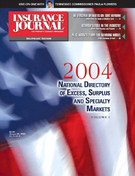Paula Flowers, the commissioner of Tennessee’s Department of Commerce and Insurance, recently set aside some time to talk with Insurance Journal Southeast regarding some of the industry issues impacting the Volunteer State.
Flowers was appointed by Democratic Governor Phil Bredesen to lead the Tennessee department, which performs a wide variety of regulatory functions and also houses the state fire marshal’s office.
A native of Monterey, Tenn., Flowers is an attorney who served as special counsel to the department’s TennCare Oversight Division before being named commissioner. She is a co-founder of the Nashville law firm of Farmer & Luna PLLC, and before that she was an associate at the Nashville law firm Waller Lansden Dortch & Davis.
From increases in several lines of the market to restructuring the process involved in fighting fraud, Flowers chats about where the industry is and where it may be in 2004.
Insurance Journal: How would you describe the current property/casualty market for independent agents in Tennessee?
Paula Flowers: Tennessee’s property and casualty market is experiencing many of the same pains that the national market is exhibiting. We have seen substantial increases in property and auto coverage rates this year to compensate for historical underwriting loss. Tennessee’s workers’ compensation rates have also increased and our assigned risk plan for workers’ compensation has a higher population than is desirable. Many independent agents across the state have suggested that availability of coverage in the property/casualty markets, particularly in the homeowners market, is becoming difficult and have suggested the implementation of a direct-assignment plan. The ripple effects of the failure of Reliance and Legion are being felt here in Tennessee, as well as the failure of three professional liability risk retention groups that insured doctors and lawyers here in Tennessee.
IJ: Are we seeing insurers in the state pulling out of or going into more markets currently and do you consider the state friendly to insurers wanting to do business there?
Flowers: We are seeing insurers becoming more cautious in their underwriting and rate setting in current markets, but have seen some new insurers enter, or gain significant market share, in specific lines. We are working aggressively on regulatory management systems and procedures to try to become even more friendly to insurers serving Tennessee’s consumers.
IJ: How has the department responded to help businesses and individuals with storms and other catastrophes that have hit the state in 2003?
Flowers: The department is multi-faceted, in that we regulate many industries in addition to insurance. When storms and other catastrophes have occurred, we have representatives who are available to answer questions and have conducted seminars and meetings with affected citizens to answer questions regarding insurance claims, contractor licensing, consumer affairs, and building code requirements.
IJ: Talk a little about the med-mal situation and do you see Tennessee as stable or reaching crisis status like a number of other states are?
Flowers: While medical malpractice liability coverage is certainly costly, we currently are not observing problems with availability of carriers to insure Tennessee doctors and hospitals. The Tennessee market was affected by the failure of Reciprocal of America, Doctors’ Insurance Reciprocal, and The Reciprocal Alliance, but there are strong, solvent companies available to Tennessee’s medical professionals. We are carefully examining the rate filings of med-mal carriers, and encourage Tennessee’s medical professionals to examine their rates and use available remedies to appeal rates that they believe are excessive or unfairly discriminatory to their practice or specialty.
IJ: How has the department fought insurance fraud in the state and how many resources (people, budget, etc.) are available within the department to fight it?
Flowers: The department enjoys a good working relationship with Tennessee’s law enforcement community and agencies like the Tennessee Bureau of Investigation help investigate instances of fraud by consumers and medical providers. The department is currently restructuring our insurance investigatory resources to create a tool for insurance companies and other units in the Insurance Division for investigation of suspected fraud and preparation of cases for criminal prosecution.
IJ: What are your goals as commissioner in 2004?
Flowers: As commissioner of a department whose mission is as diverse as that of the Department of Commerce and Insurance, I have established both general and specific goals for all of the regulatory functions we perform. First, we are developing better information systems to assist us in performing our regulatory function more efficiently and effectively. These information systems will allow us to make a tremendous amount of information about regulated companies and professionals available to the public and industry via the Internet. I believe this is important because a well-informed consumer is a better regulator of any market or profession than any governmental agency. Secondly, we are examining current laws and regulations to identify changes that need to be made to address problems that we identify and toeliminate requirements that do not keep pace practically with the way that today’s businesses operate. By understanding better how the industries and individuals that we regulate operate, we can strengthen and streamline our systems to be more user-friendly to the regulated community and the consumer. Lastly, we are focused on “getting the talk right” by sharing more information about the department’s resources and regulatory actions with Tennessee’s business community and consumers. Communicating requirements and regulatory actions will enhance accountability in Tennessee’s regulated business community.
To learn more about the department, visit www.state.tn.us. To comment on this story, e-mail: dthomas@insurancejournal.com.
Was this article valuable?
Here are more articles you may enjoy.


 Chubb CEO Greenberg on Personal Insurance Affordability and Data Centers
Chubb CEO Greenberg on Personal Insurance Affordability and Data Centers  Married Insurance Brokers Indicted for Allegedly Running $750K Fraud Scheme
Married Insurance Brokers Indicted for Allegedly Running $750K Fraud Scheme  Maine Plane Crash Victims Worked for Luxury Travel Startup Led by Texas Lawyer
Maine Plane Crash Victims Worked for Luxury Travel Startup Led by Texas Lawyer  GEICO Settles Call-Center Worker Suits for $940,000; Attorneys Get Half
GEICO Settles Call-Center Worker Suits for $940,000; Attorneys Get Half 


